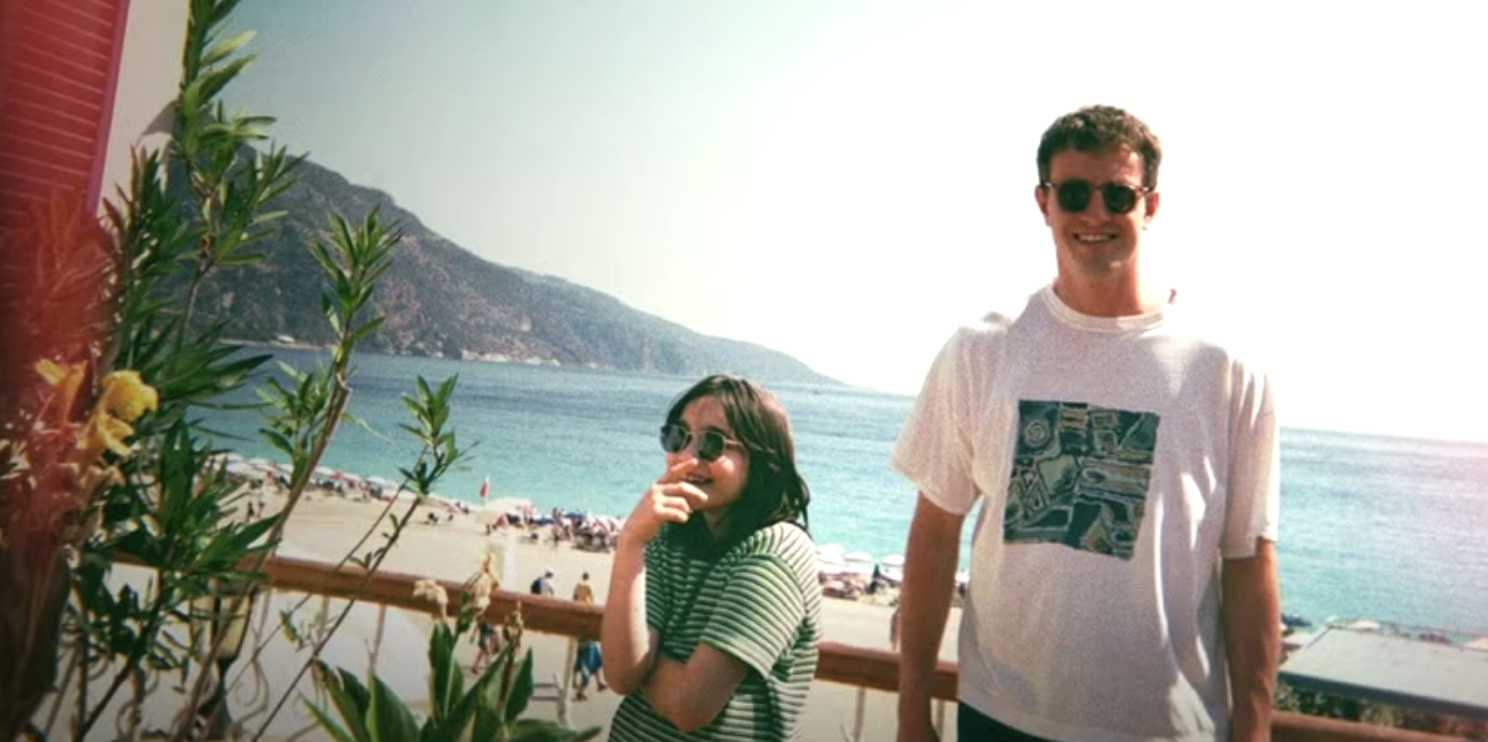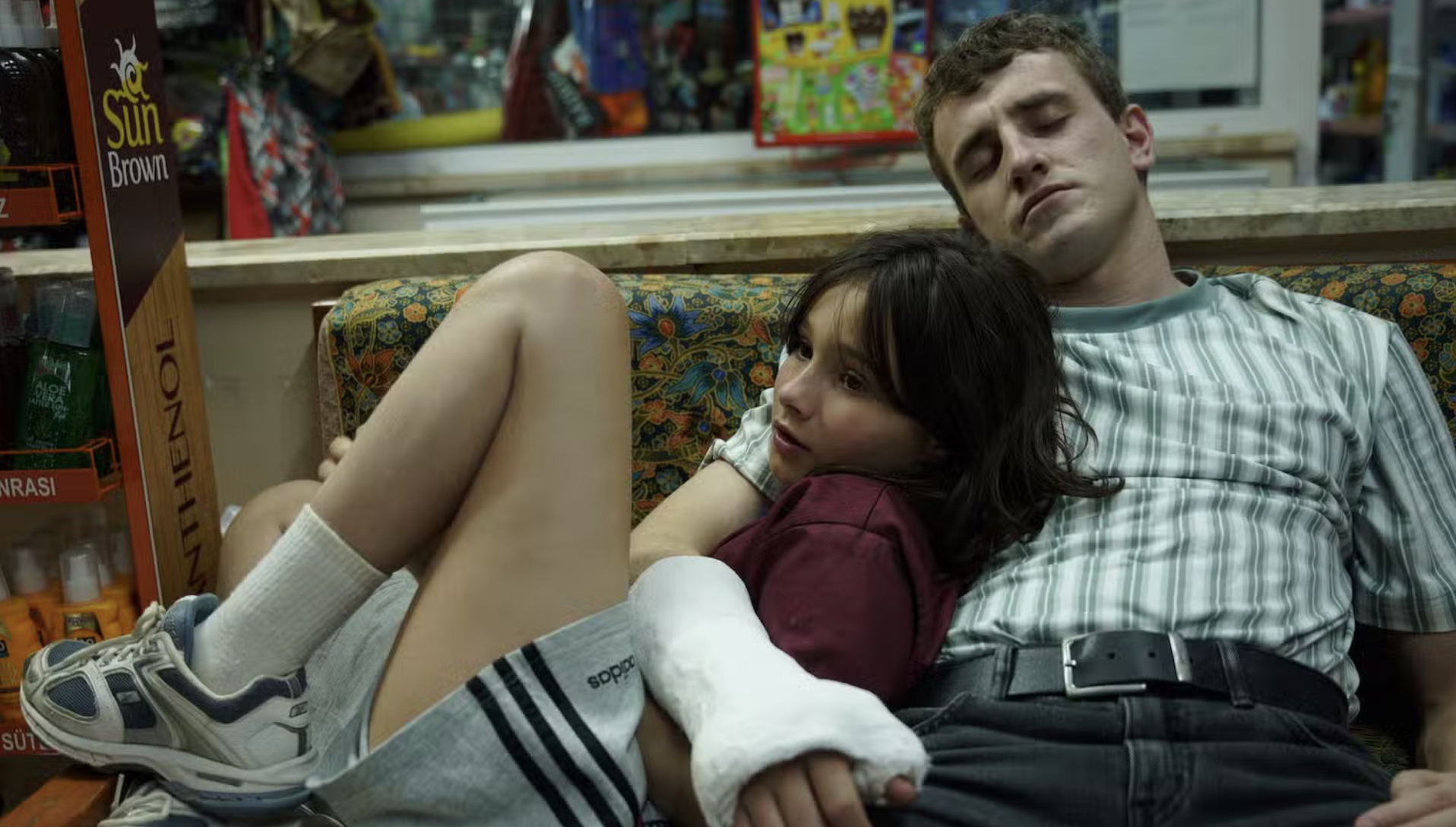‘Aftersun’ - Review
The first sound in Charlotte Wells’ feature full-length debut Aftersun (2022) is the sound of a camcorder. Through this camcorder’s eye, Sophie (Frankie Corio) announces that it is her eleventh birthday, and that it is her father (Paul Mescal) Calum’s “one-hundred and thirty-[first]” birthday in two days. “When you were eleven,” she asks, “what did you think you would be doing now?” The recording ends here, and as the tape rewinds, we are taken back to that summer, where Sophie and Calum have booked a tour and a guide (Sally Messham) leads them through seven stops through Muğla, Turkey. Over the course of the movie, Sophie and Calum mostly remain in that seaside resort, with occasional stops in all the touristy places of the Turkish Riviera, barring the iconic paragliding that Sophie’s too young for. That part transfixed me the most when I first saw the film. Yes, the plot moved me. Yes, the shots, the acting, the editing, all of it tremendous. But one thought moved me the most: holy shit, my country of origin?
I was twelve the first time I visited Turkey, which I suppose is relatively late compared to other diaspora kids from Austria and Germany. My actual first, when I was a year old, I do not remember and ought to be discounted. The way diaspora Turks travel to Turkey most often is by car, and every year there are guides from newspapers for diaspora Turks on how to best arrive in your chosen province, what European countries to take, what highways to follow (E80 was our lodestar). The drive, for us, was a little over forty hours long and came about because my grandfather suffered a stroke. We went with my uncle’s family; our entourage was two big-sized cars, and the journey a brutal stretch of concrete. The trek had a brief stop past the Ipsala border, and then another one at a breakfast joint somewhere in Aydın, a province on the Aegean coast. It was on this trek that I first saw the sea, and more importantly smelled its brine. It stretched over the horizon with no end in sight; then as now, it wowed me. Soon, that faded away. Our village is at the foot of a mountain. Though the province we’re from is considered Mediterranean, it is a landlocked one.
We stayed there for six weeks. It was brutally hot and even worse inside my grandfather’s apartment. People bickered all the time. They gossiped every opportunity they could get. More than once, one of our family members was in tears over an argument. There was a cat that my grandfather scared away. Sometimes I still see slaughtered goats hanging in the courtyard for the annual Eid al-Adha celebration, blood dripping down the drain in my mind’s eye. But before writing this essay, had anyone asked me about this trip, I’d have only remembered the pictures. There was a picture of my baby cousin that was always the PC wallpaper. There were the pictures we took with our own digital camera that I must have combed over so many times they replaced the actual memories. There was a picture, for instance, of my socks touching the car dashboard. Only through that picture do I remember that I was trying to sleep at my usual bedtime, away from the comfort of my own bed. Sleep eluded me that night, but I slept through North Macedonia both en route to our village and back home. We went there for my grandfather, but so little of my memories, even with the aid of writing and actively trying to remember, bring him to mind.
Calum also winds up sleeping on the route to a mud bath, which is understandable as it is so early in the morning when they have to go. This is relatively late into the film, and the camcorder shots — the sole video footage Sophie will have of the trip — have come and gone. A polaroid marks the occasion of their penultimate night, but after that, it is Sophie’s memory alone.That alone is nothing to scoff at: she remembers the touch of hands, bodies in close contact as a symbol of her burgeoning sexuality. She remembers when she fought with her father over karaoke and got lost trying to find her way back to the hotel room without him. She remembers the time she kissed the fellow British boy she kinda-sorta fancied, and the time she watched two cool teens make out against a doorframe. But the moment that lingers in her mind forever is at the very last night. It is dance night and Calum pulls an initially resistant Sophie into the crowd. Or does he? The dance flickers to the rave of her mind, where her father is always dancing. Sophie visits this place as an adult many times, as well as the camcorder recordings that she’s made. Each time, she tries to embrace her father; each time, he falls and slips away.
The vacation is not all perfect. Calum wants to be a father to Sophie — he asks her to tell him anything when she’s old enough to try drugs, which unsettles her a little; he teaches her self-defense, which she doesn’t get right away and frustrates them both — but Sophie wants to find her own way, the way all pre-teens do. One of the arguments that Sophie hurls at Calum, the one time he refuses doing aforementioned karaoke night with her, is that he is strapped for cash. There are hints of it throughout the movie, like the fact that their hotel stay does not include beverages (indicated by a yellow bracelet), the various financial ventures that Calum swears will work out this time, or the expensive diving glasses that Sophie loses. Despite all this, Calum wants to make it a good holiday for him and his daughter. The locale is gorgeous and the stops aplenty, the food delicious and the water refreshingly cool. The residents love it here; twice in Alanya, I was told by vendors the place was “Heaven on earth”.
Tourists would no doubt echo that sentiment, but it comes with a price. I wondered how much Calum had to pay for even the most basic tourist things. The Turkish Riviera, consisting of popular spots Antalya, Fethiye/Ölüdeniz (in Muğla province, where Aftersun was shot), Bodrum, Manavgat, and Alanya (all popular among Europeans, particularly the British, German, and Russian), is a place that quite clearly knows its draws and will suck any visitor dry that wants to visit. In Alanya, a Turkish entrance guard asked my brother and I how come we speak Turkish but don’t hold Turkish citizenship. He then ended up charging us the tourist entrance fee: 10€ (4500 TL) and not the usual 120TL. Tour packages are more expensive, listed in Euro, than the regular old bus, for the locals and in Lira. These places are calibrated for tourists. Calum chats with their diving guide, a diving instructor named Umut. Like a number of people working in tourist spots, Umut’s main income comes from what Turks dub “the season” (the summer). It is never mentioned what he does in the off-season, when tourist numbers come down to a trickle and the income dips, only that Umut’s maternal grandmother wishes he had a proper job. His English is strong. Pharmacists, supermarket vendors, and hotel staff are at minimum fluent in Russian and English; the expectation is that nobody speaks Turkish, but during my stay in Alanya, there was palpable relief when we did speak it.
Sophie and Calum speak some Turkish in Aftersun, as well. At least Sophie attempts to say thank you to the clerk (“teşekkür ederim” becomes “tea sugar ederim” for ease of pronunciation) who hands them black tea in slenderly curved glasses. Elsewhere, a Turkish guard watches a soccer match, and a mention of “Hakan” lets us know that Hakan Şükür, Galatasaray stalwart between 1995 and 2000, has received the ball. Candan Erçetin’s 2002 hit “Gamsız Hayat” plays from the speakers at a café, and the rug vendor converts between Lira and Euro in his head with such ease that it makes for a tantalizing glimpse into the economic reality of Turkey, something that persists and has worsened since the nineties, when the movie is set. Umut used to travel a lot, but has chosen to stay at home with a baby on the way, something that he didn’t expect to have before forty. He couldn’t stay far away from home. One wonders if he could afford that for long anyway.
Calum, for his part, is surprised he made it past thirty; having left Edinburgh, he feels he cannot ever come back. Are we home simply because we are with the people we love? Are we home at any given point, or is home only attainable if we can escape the prison of our own heads? Being away from home and encountering hospitality only adds to the complexity of the issue. It is a relief because you are briefly away from your day-to-day. But when the move is permanent, home becomes an odd, distorted sort of thing. It is then that this word — usually so clear and physical — transforms to an intangible concept, so gossamer it might as well not exist. In that way, it is similar to memory.
In the end, it may well be that home is so small a space that it fits between a hug, and so vast a chasm that two hearts can never touch. Sophie gets to hug her father in their last-ever dance, a superb “Under Pressure” blasting from the speakers and the only time Calum looks carefree, past his rough childhood and drug abuse, so happy he might not be real. She gets to wave him goodbye at the airport, and as an adult, she gets to relive the moments with him forever after, for as long as she’s alive. But it is a bittersweet exchange, because memories fade and go, and they are not the same as the real thing. Sophie gets to revisit her father forever after in her memory. She is in a rave where he is forever dancing, just as he enjoys it. She cannot see him properly under the strobing lights. And she cannot hug him again, because every time, he will fall and fade away, the ghost that held the camera as Sophie left.
There’s so few memories that I have of my grandfather; some of it is by design. Most of it is because of my last memory with my grandfather. It is 2020, and he is in the hospital. We cannot visit him due to the pandemic, so my father calls him by video. The picture’s a little pixelated, but my grandfather is cleanly shaven, too shaven for my liking. He cannot recognize us. He can’t recognize his daughter, his son-in-law, and there is no hope for his grandchildren watching him. My father keeps trying, introduces himself by name, but it falls on deaf ears and we quit the call. My grandfather dies a few weeks later in December of the same year. He was in his eighties. My mother is inconsolable. She and my father travel to Turkey for the funeral; when we videocall them, it is brief, but she seems fine. But isn’t it funny — it’s with the death of my coworker three years later that I start to take pictures and videos of everyone all the time. Because it’s better to have something as intangible as pictures, the replica of an experience, than to have nothing at all.



